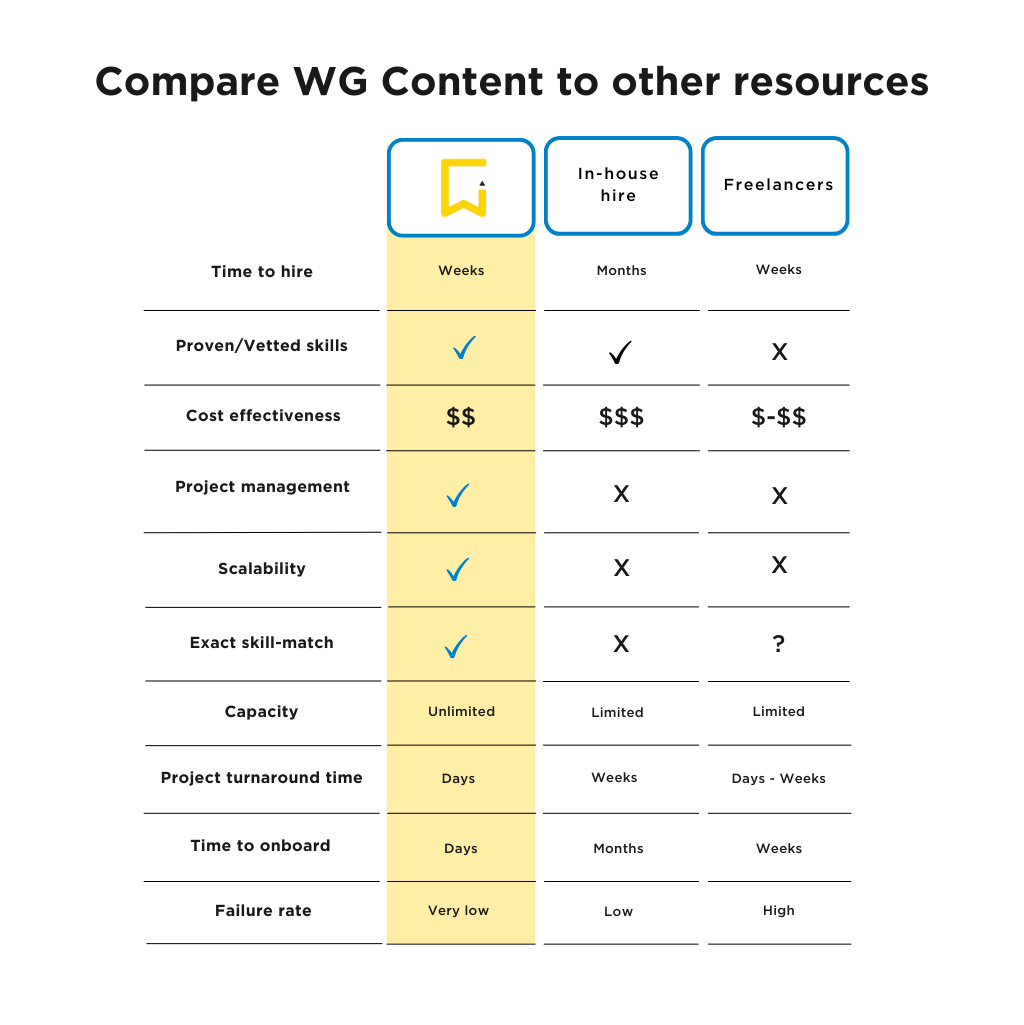Want more insights on all things content?
Sign up for WG Content’s newsletter, Content Counts.



Explore options when outsourcing content writing or marketing between in-house writers, freelancers or agency partners.


Author: Heather Stanley
Last updated: 02/27/24
There comes a time in every marketer’s life when the demand for content outweighs their organization’s internal capacity. Maybe you’re in a stage of high-growth and your team can’t keep up. Maybe your team is missing publication deadlines. Or maybe your content needs have outgrown your internal skillset.
At this point, you need to make a tough decision. Should you hire internally? Find freelancers? Connect with an agency? Each option comes with benefits and risks. Let’s explore them.
Some believe internal hires are easier to manage than freelancers and agencies. After all, you have complete control over their time, can prioritize their work and can train them to create content according to your brand guidelines.
You can also ensure your hire meets specific criteria, such as industry experience or technical skill. And you can make sure they are a match for the team in terms of work style and personality.
Getting approval to hire a full-time employee (FTE) isn’t easy. Most hiring managers must prove the urgent and sustained need for more staff and justify adding “unseen” costs to the payroll, such as equipment, taxes and benefits. Adding headcount is a calculated decision.
Productivity also comes into play. You may find it surprising that while you hire an internal employee for 2,080 hours a year, they may only produce content half of that time. The top reasons for the lower productivity include:
Plus, your writing needs can (and will!) change.
If you are hiring an internal content writer, each person you interview brings different skills, experience and knowledge to the table. And those skills don’t always match your overall needs. One project may require in-depth search engine optimization knowledge and another, interviewing skills. Sometimes, you need impressive short-form copywriting skills; other times, you need long-form technical writing know-how. It’s hard to find all those skills in one hire.
Numerous online platforms make it easy for companies to find freelancers. Content writers on Upwork and Fiverr charge anywhere from $15 an hour to $300 an hour and usually come with some reviews so you can evaluate their quality. You can also place ads for content writers. Either way, you’ll need to find the time to review applications, writing samples, interview and onboard them.
Other companies find freelancers from their industry networks, such as former employees or writers you’ve worked with at different companies or agencies. Tapping into networks can speed up the process since your familiarity means you might not need to vet them as diligently. Working with local freelancers also has unique benefits: you’re supporting local entrepreneurs, they can often come on-site if needed, and they understand their markets’ demographics and community nuances.
While freelancers can often be a cheaper option and provide flexibility to scale up or down depending on your workload, they do come with drawbacks:
Working successfully with freelancers comes down to the quality of the freelancers you find and your ability to dedicate internal time to project management (assigning tasks, answering questions) and administration (tracking invoices and payment).
The more freelancers you work with, the larger the need to manage their work. Often, each freelancer will have their own work style you’ll need to adapt to. Each has a different skill set, and knowing where they deliver the most value takes time. Even when they say they can write everything, it takes time to evaluate their work and ensure you match your projects with their expertise.
Get more healthcare marketing tips and best practices: Subscribe to the WG Content newsletter!
For many organizations, partnering with a content agency provides the best of both worlds. Having an external partner to help you scale, coordinate and find talent with the right skills in the right areas adds value. It’s a wise investment. Top benefits include:
WG Content is a seasoned content agency that brings the best of internal resources and freelance writers to your project. Here’s a handy rundown of how we compare to in-house hires and freelancers across numerous factors.

The right answer for your content development needs depends on your budget, project management resources, the number of projects and the level of quality you expect. For many organizations, partnering with a proven content agency like WG Content is the logical choice option. With a content agency, marketers can tap into expert writers with diverse experience without the headache of finding, vetting and training freelancers or onboarding a full-time hire.
Whether you’re looking to fill your blog pipeline, refresh or overhaul your website content or make your thought leadership dreams a reality, WG Content is the complete package. Contact us today to talk about your goals and see what our team of content strategists and creators can do for you.
The right answer for your content development needs depends on your budget, project management resources, the number of projects and the level of quality you expect. For many organizations, partnering with a proven content agency like WG Content is the best option. With a content agency, marketers can tap into expert writers with diverse experience without the headache of finding, vetting and training freelancers or onboarding a full-time hire.
The more freelancers you work with, the larger the need to manage their work. Often, each freelancer will have their own work style you’ll need to adapt to. Each has a different skill set, and knowing where they deliver the most value takes time. Even when they say they can write everything, it takes time to evaluate their work and ensure you match your projects with their expertise.
For many organizations, partnering with a content agency provides the best of both worlds. Having an external partner to help you scale, coordinate and find talent with the right skills in the right areas adds value
Sign up for WG Content’s newsletter, Content Counts.



Find out how four hospitals use email newsletters to drive...


Follow these email marketing tips and learn how to engage...


Find out how these health systems support DEI holidays, like...
All Rights Reserved. Site by Reason One